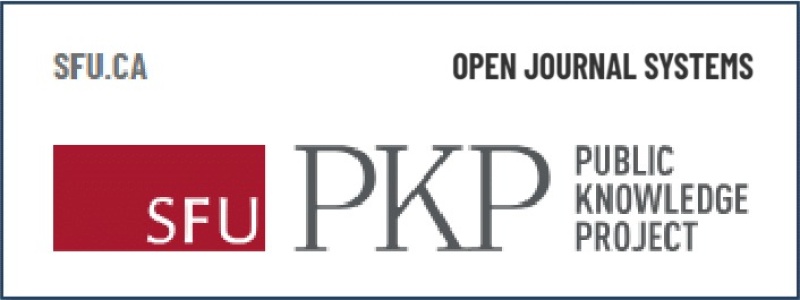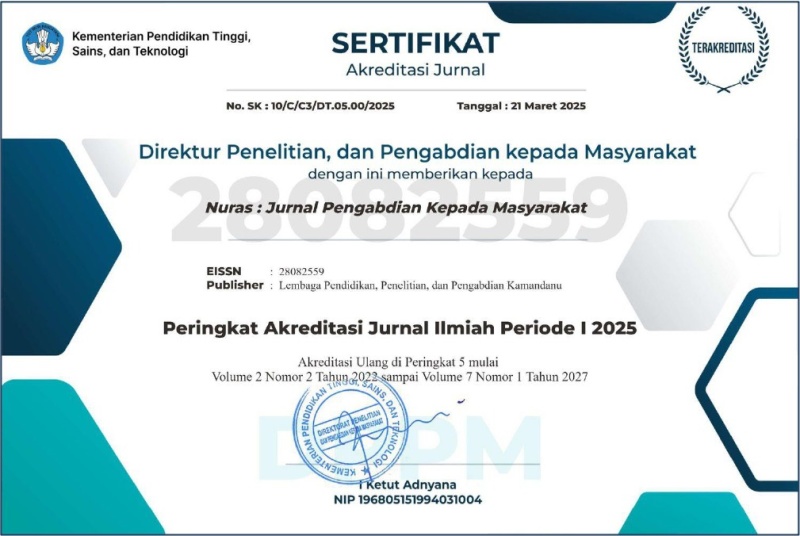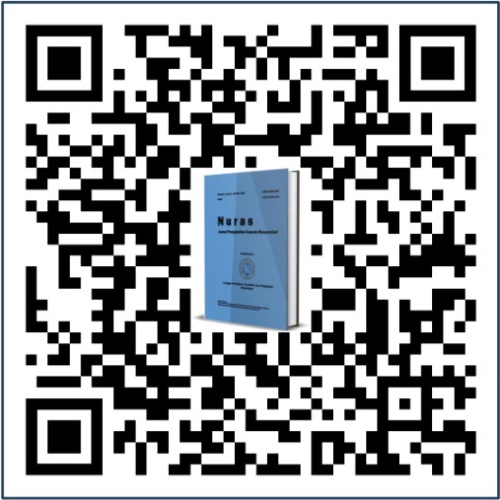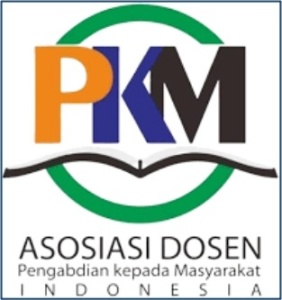Pelatihan dan Pengenalan Dasar-dasar Bahasa Inggris untuk Tingkat SD dan SMP sebagai Upaya Meningkatkan Kualitas Berbahasa Inggris pada Usia Anak-anak
DOI:
https://doi.org/10.36312/nuras.v4i2.268Keywords:
Training, Introduction, Basics of English, Quality of English, Children's Age.Abstract
English is a very vital language to learn. In the Indonesian school curriculum, a student's ability to communicate in English is one of the skills that must be developed. This is because later students can encounter learning that uses this language and it becomes additional value for the students' abilities. The aim of this activity is to train and introduce the basics of English for elementary and middle school levels as an effort to improve the quality of English at the age of children. The stages or steps of the activity are as follows: 1) discussion with the activity implementer regarding the concept of the home learning program. In this discussion, the activity organizer determines the theme, schedule and location of the program; 2) consult and seek approval with the Village Head regarding the program to be held; 3) make activity brochures to distribute. Here the official schedule and location are determined; 4) ask permission from each head of the region where the study house is being held. The location of the program was implemented in Pandan Wangi Village, Jerowaru District, East Lombok Regency with a sample of five hamlets, namely Batu Bawi Bat, Batu Bawi Timuk, Penyambak, Pengansing, and Belatung hamlets; 5) location survey for implementing home learning activities in each hamlet; 6) socialize the home learning program to every elementary and middle school level in the five hamlets while distributing brochures; 6) start implementing the home learning program which is held every afternoon from Monday to Friday in five different hamlets; and 7) evaluation and discussion of each program result that has been implemented. Service activities that have been carried out include: 1) introductions using English; 2) learn the use of this, that, these, and those; 3) learn the pronunciation of the alphabet; 4) introduction using English; 5) study noun material; 6) study subject and pronoun material; 7) learn the pronunciation of numbers 1-10 in English; and 8) evaluation. Based on the description of the activities that have been carried out, it can be concluded that: 1) the focus of the service activity program is to improve the quality of human resources through language learning, both among village children and teenagers. Making the joint learning program a successful program to increase the interaction courage of village children as well as increasing children's interest and awareness in learning English as an international language has shown the success of the initial planning for implementing service activities; and 2) the obstacles experienced by implementers during the activity were the difficulty of increasing children's awareness of the importance of mastering international languages in this millennial era.
Downloads
References
Anika, A., Nurhadiah, N., & Apriani, G. (2017). Hubungan Motivasi Belajar dengan Hasil Belajar Siswa pada Mata Pelajaran IPA Kelas VII SMP Negeri 3 Sintang. Edumedia: Jurnal Ilmiah Keguruan dan Ilmu Pendidikan, 1(1), 1-3. https://doi.org/10.51826/edumedia.v1i1.54
Ariningsih, N. L. T., Fitriani, H., & Safnowandi, S. (2023). Pengaruh Model Pembelajaran Student Teams Achievement Division (STAD) terhadap Motivasi dan Hasil Belajar Kognitif Siswa. Educatoria : Jurnal Ilmiah Ilmu Pendidikan, 3(4), 248-261. https://doi.org/10.36312/educatoria.v3i4.214
Azis, A. L. (2017). Pengaruh Motivasi Intrinsik dan Motivasi Ekstrinsik terhadap Prestasi Belajar Ekonomi Bisnis Kelas X Peserta Didik Kelas X di SMKN 4 Makassar. Skripsi. Universitas Negeri Makassar.
Dwihartanti, M., & Faizah, N. (2018). Pentingnya Penguasaan Bahasa Inggris bagi Pelaksanaan Tugas Rutin Sekretaris. Jurnal Efisiensi: Kajian Ilmu Administrasi, XV(1), 28-35. https://doi.org/10.21831/efisiensi.v15i1.24483
Fadli, M. R. (2021). Hubungan Filsafat dengan Ilmu Pengetahuan dan Relevansinya di Era Revolusi Industri 4.0 (Society 5.0). Jurnal Filsafat, 31(1), 130-161. https://doi.org/10.22146/jf.42521
Indriyani, N., & Usriyah, L. (2022). Pentingnya Belajar Bahasa Inggris di Sekolah. Sabilarrasyad: Jurnal Pendidikan dan Ilmu Pendidikan, 7(1), 39-45. https://doi.org/10.46576/jsa.v7i1.3127
Lukita, D., & Sudibjo, N. (2021). Faktor-faktor yang Mempengaruhi Motivasi Belajar Siswa di Era Pandemi Covid-19. Akademika: Jurnal Teknologi Pendidikan, 10(1), 145-161. https://doi.org/10.34005/akademika.v10i01.1271
Nasution, S. (2018). Peranan Bahasa Inggris sebagai Tolok Ukur Pesatnya Perekonomian di Indonesia. Jurnal Bisnis Net, I(2), 61-70. https://doi.org/10.46576/bn.v1i2.328
Rahman, S. (2021). Pentingnya Motivasi Belajar dalam Meningkatkan Hasil Belajar. In Prosiding Seminar Nasional Pendidikan Dasar (pp. 289-302). Gorontalo, Indonesia: Pascasarjana Universitas Negeri Gorontalo.
Rumhadi, T. (2017). The Urgent of Motivation in Learning Process. Inovasi: Jurnal Diklat Keagamaan, 11(1), 33-41.
Saepudin, S. (2014). An Introduction to English Learning and Teaching Methodology. Yogyakarta: TrustMedia.

Downloads
Published
How to Cite
Issue
Section
License
Copyright (c) 2024 Sabrina Damayanti

This work is licensed under a Creative Commons Attribution-ShareAlike 4.0 International License.
-
Attribution — You must give appropriate credit, provide a link to the license, and indicate if changes were made. You may do so in any reasonable manner, but not in any way that suggests the licensor endorses you or your use.
-
ShareAlike — If you remix, transform, or build upon the material, you must distribute your contributions under the same license as the original.

















































